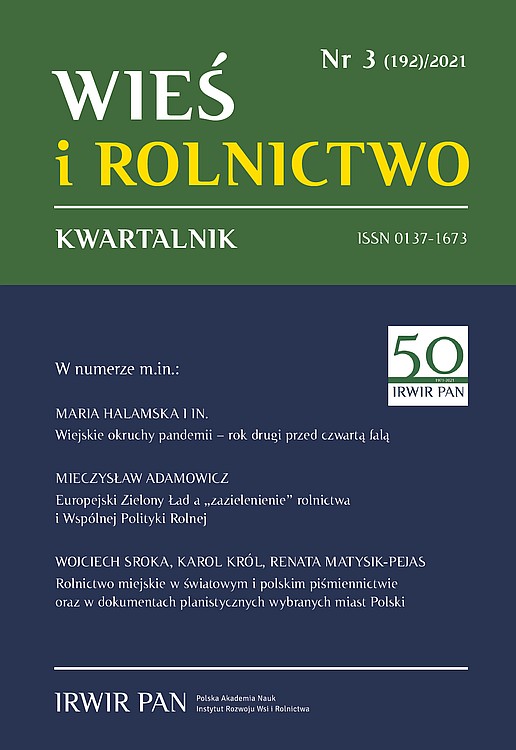The European Green Deal, the Greening of Agriculture and Common Agricultural Policy
DOI:
https://doi.org/10.53098/wir032021/02Keywords:
green economy, green deal, sustainable development, green agricultural architecture, agricultural policy greeningAbstract
The topic of this study is the concept of the European Green Deal, especially, in relation to the Common Agricultural Policy (CAP) as well as to the role of agriculture in the greening processes, in particular in the pursuit of maintaining environmental protection, biodiversity, and preventing climate changes. Currently, the concept of the green economy implemented in the EU is known as the European Green Deal. The special function in the implementation of the Green Deal is attributed to the greening of the CAP, to the modernised strategy of the food flow “The Farm to Fork” in shortening of the supply chains, to creating the new forms of circular economy and to various actions taken to tackle climate change. All these green concepts are connected with the paradigm of sustainable development and they have become the form of the sustainable development execution in the strategies developed. This study is based on the relevant scientific literature and the official documents provided by the EU and UN agencies, and other international institutions and organisations. The implementation of the Green Deal in agriculture and in the agricultural areas requires creating a new architecture of connections between the production tasks in agriculture and the actions that improve the environment and climate, as well as requiring an efficient system of non-productive activity evaluation, measuring its effects and costs. The involvement of agriculture in creation of public goods should be appropriately rewarded. The green concepts of the sustainable development implementation require investment and educational support. The green concepts of development embrace many ambitious assumptions and can thus be considered too optimistic.
References
Adamowicz M. (2021a). The potential for innovative and smart rural development in the peripheral regions of eastern Poland. Agriculture, 11 (3), 188. DOI: https://doi.org/10.3390/agriculture11030188
Adamowicz M. (2021b). Agricultural development processes in the context of globalization challenges and the new approaches to the concept of sustainable development. Zagadnienia Ekonomiki Rolnej, 366 (1), 24–45. DOI: https://doi.org/10.30858/zer/132395
Adamowicz M. (2019). Wspólna polityka rolna Unii Europejskiej jako forma wsparcia finansowego rolnictwa i obszarów wiejskich. W: S. Juszczyk (red.). Finanse agrobiznesu (s. 39–104). Warszawa: Wydawnictwo Naukowe PWN.
Adamowicz M., Zwolińska-Ligaj M. (2018). New concepts for rural development in the strategies and policies of the European Union. Economic and Regional Studies/Studia Ekonomiczne i Regionalne, 11 (3), 7–31. DOI: https://doi.org/10.2478/ers-2018-0022
Allen C., Clouth S. (2012). A Guidebook for the Green Economy. New York: Division for Sustainable Development, UNDESA.
Atkisson K., Atkisson A. (2013). Green Economy 2013: A Strategic Briefing on the State of Play in the Global Transition. Atkisson Group’s Sustainability Intelligence Unit.
Bąk I., Cheba K. (2020). Zielona gospodarka jako narzędzie zrównoważonego rozwoju. Warszawa: CeDeWu.
KE [Komisja Europejska] (2020). Strategia „od pola do stołu” na rzecz sprawiedliwego, zdrowego i przyjaznego dla środowiska systemu żywnościowego. COM(2020) 381 final. Bruksela: Komisja Europejska.
KE [Komisja Europejska] (2019). Europejski Zielony Ład. COM(2019) 640 final. Bruksela: Komisja Europejska. https://eur-lex.europa.eu/legal-content/PL/TXT/?zuri=CELEX%3A52019DC0640 (dostęp: 06.09.2021).
Kozar Ł. (2017). Rozwój zielonej gospodarki w sektorze rolnictwa w krajach Unii Europejskiej i w Polsce w kontekście koncepcji zrównoważonego rozwoju. Zeszyty Naukowe SGGW w Warszawie – Problemy Rolnictwa Światowego, 17 (3), 195–206 DOI: https://doi.org/10.22630/PRS.2017.17.3.66
Kułyk P., Gąsiorek-Kowalewicz A. (2018). Rozwój zielonej gospodarki w krajach Grupy Wyszehradzkiej. Zeszyty Naukowe SGGW w Warszawie – Problemy Rolnictwa Światowego, 18 (2), 193–206. DOI: https://doi.org/10.22630/PRS.2018.18.2.47
MRiRW [Ministerstwo Rolnictwa i Rozwoju Wsi] (2020). Ekoprogramy. Prezentacja przygotowana na Spotkanie Grupy Roboczej w MRiRW w dn. 13 lutego 2020 r. Warszawa: Departament Płatności Bezpośrednich, Ministerstwo Rolnictwa i Rozwoju Wsi.
Olivieri M., Andreoli M., Vergamini D., Bartolini F. (2021). Innovative contract solutions for the provision of agri-environmental climate public goods: A literature review. Sustainability, 13 (12), 6936. DOI: https://doi.org/10.3390/su13126936
Rada Europejska (2020). Przyszłość Wspólnej Polityki Rolnej po 2020 roku. Bruksela: Rada Europejska.
Stanny M. (2014). Zróżnicowanie terytorialne wybranych problemów ludnościowych w kontekście rozwoju społeczno-gospodarczego polskiej wsi. Studia Ekonomiczne, 167, 9–21.
Wrzaszcz W., Prandecki K. (2020). Rolnictwo a Europejski Zielony Ład. Zagadnienia Ekonomiki Rolnej, 365 (4), 156–179. DOI: https://doi.org/10.30858/zer/131841
Ziętara W., Mirkowska Z. (2021). The green deal: Towards organic farming or greening of agriculture? Problems of Agricultural Economics, 368 (3), 29–34. DOI: https://doi.org/10.30858/zer/135520











